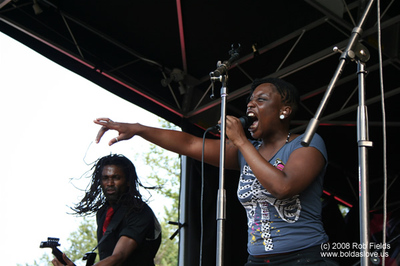Yes, and here’s why.
It tends to be Black folks who ask me this question the most. The follow-up is usually an attempt at refining the question: "I mean, why can’t it just be rock?" Unpacked, this means they are exploring genres and modes of expression outside of what is typically understood to be Black music, i.e., it ain’t straight up hip hop or R&B or some combination thereof. Since their Blackness is self-evident, they imply, there should be no reason to use what amounts to a kind of double subject. They’re Black and they "rock", both in sound and attitude.
But the "Black" in Black rock has its uses. First, much in the way James Spooner talked about the term Afropunk, Black rock is a great banner around which likeminded folks can gather. A beacon on a hill, if you will. Once you find us, you can come and go as you please.
Second, it is important for it to be political. What I’m really interested in is challenging those African Americans who are comfortable, complacent even, in the status quo of what it means to be Black and help them out of that straitjacket. The more of us who "get" Black rock–and attitude and aesthetic is way more important than a particular sound–the more it’s going to matter. The more it matters, the more we can pull our culture away from the self-aggrandizing and hyper-materialistic impulses that are running rampant.
When you say "Black rock," it fires the imagination, and that’s what I want it to do. After all, you can’t really be sure of what you’re going to get, in the same way that you can when someone says "hip hop". Black folks need to be clear that rock’s got everything to do with them. Every artist that falls under this banner is drawing on a history that’s complicated, complex and rich, one that encompasses our experiences in this country, our connection to whatever motherlands we’re from, and the unique ways that we synthesize our interactions with others. These are people who are not afraid to embrace the fullness of both their humanity and their American-ness. They become examples for the rest of us.
In that regard, the black in Black rock is highly political: It’s about challenging us to embrace our cultural power and claim our humanity, and exercise our right to full participation. Which brings me to my final point.
I’m slowly making my way through Richard Iton’s In Search of the Black Fantastic: Politics & Popular Culture in the Post-Civil Rights Era. If it sounds like an academic treatise, that’s because it is. There are a lot of good and thought-provoking ideas about the role of popular culture and its actors (writers, artists, filmmakers, etc.) in politics, but here’s an idea I found illuminating:
The black in black fantastic, in this context, signifies both a generic category of underdeveloped possibilities and the particular "always there" interpretations of these. . .visions and practices generated by subaltern populations.
So, for me, the black in Black rock is about the underdeveloped and, I’d say, unexplored, possibilities of our imagination, our creativity and our identity.
Until we max out in these regards, I’m calling this music Black rock.
What do you think?

